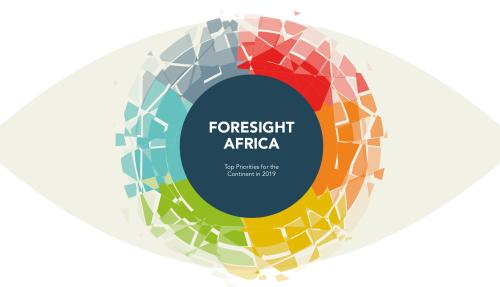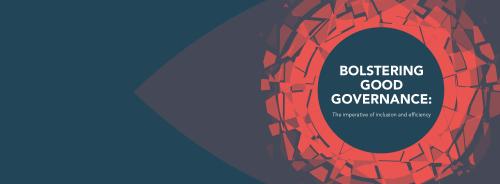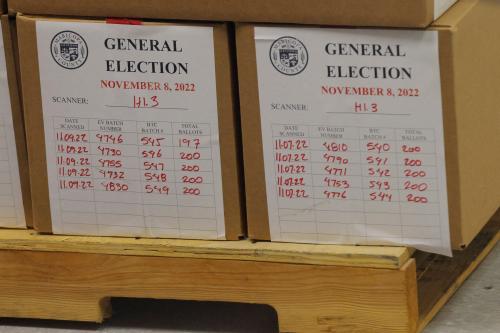Below is a viewpoint from Chapter 1 of the Foresight Africa 2019 report, which explores six overarching themes on the triumphs of the past years as well as strategies to tackle the remaining obstacles for Africa. Read the full chapter on bolstering good governance.
In 2019, general elections will be held in many African countries, offering them an opportunity to deepen, consolidate, and institutionalize democracy and strengthen their governance systems. Nevertheless, as the 2018 presidential elections in several African countries have shown, without a governing process supported by true separation of powers, effective checks and balances, an independent judiciary, a free press, and a robust and politically active civil society, the 2019 elections will most likely have limited impact on freedom and equality across the continent.
Priorities for the declared winners of the 2018 elections
In Cameroon, President Paul Biya emerged victorious, unsurprisingly, having supposedly captured 71.28 percent of the vote. Several opposition candidates and ordinary Cameroonians pointed to massive fraud. In addition, the election was marred by high levels of insecurity and violent extremism in at least three of the country’s 10 regions—the Far North, Northwest, and Southwest regions. The violent response by the security forces to peaceful protests by teachers and lawyers against the political and economic marginalization of the Anglophones by the Francophone-dominated central government has morphed into what is being described by the international community as genocide. The “re-election” of Biya for another seven-year term has all but killed any prospects that the 2018 election would lead to the deepening and institutionalization of democracy in the country, as well as significantly improve the security situation in the country, one of Cameroon’s top priorities.
An effective way to fight terrorism and other security threats in Mali and the broader Sahel region is to promote political and economic inclusiveness.
In Mali, incumbent President Ibrahim Boubacar Keïta was reelected for a second term with 67 percent of the votes cast. Although there were allegations of irregularities, the African Union adjudged the elections credible and transparent. Other observers argued that the elections were credible but raised concerns. This election was supposed to dispel Malians’ chronic mistrust of their political institutions, which emanates from the government’s failure to deal with human rights violations, corruption, and nepotism. President Keïta’s regime must now deal fully with corruption and impunity, as well as address pervasive poverty, high levels of material deprivation, and political and economic marginalization. It must also be understood that the foundation of an effective way to fight terrorism and other security threats in Mali and the broader Sahel region is to promote political and economic inclusiveness, as well as the protection of human rights.
In the Democratic Republic of Congo (DRC), the term of President Kabila expired in 2016. After postponing the elections for two years, they were finally held last December, but excluded Moïse Katumbi, the popular former governor of the Katanga Province. The focus for the new regime must be nation building and the effective elimination of threats to peace and security. To accomplish this goal, the new government must be inclusive and must pre-occupy itself primarily with state reconstruction to provide the country, through a participatory, inclusive, and people-driven process, with institutional arrangements that are capable of promoting peaceful coexistence and enhancing inclusive economic growth.
Key elections to watch in 2019 are those in Nigeria and South Africa
Nigeria will hold general elections on February 16, 2019, to elect a president and members of the National Assembly. Muhammadu Buhari, who was elected president in 2015, is seeking re-election. The 2019 elections will be the sixth national electoral exercise since transition to democracy in 1999 and an opportunity for Nigerians to undertake peaceful change of government as they had done in 2015. As many as 16 other individuals have declared their intention to contest the presidential race. As candidates prepare to articulate and bring their platforms to the electorate, there is fear that the elections will be marred by violence.
While many observers see Boko Haram as the greatest threat to peace and security in Nigeria, and hence, to the 2019 general elections, it is important to also recognize the various structural and institutional problems that plague the country. These include, but are not limited to, severe inequalities in wealth and income distribution, religious and ethnocultural divisions, and weaknesses in the political, administrative, and judicial foundations of the state, which have produced high levels of bureaucratic and political corruption, including public financial malfeasance.
An emerging and important threat to peace and, in particular, the election, is the violent conflict between farmers and herders over land- and water-use rights. In fact, in some states in northern Nigeria, many of these clashes have become deadly. Government, at both national and local levels, remains incapable of dealing effectively with extreme poverty and providing all Nigerians with effective mechanisms for self-actualization.
Finally, Nigeria’s political parties continue to suffer from in-fighting and are proving incapable of improving the state of democracy in the country. Despite the tremendous improvements that have been made since transition to democracy in 1999, Nigeria has not been able to provide itself with a governance system capable of adequately constraining the state and, hence, preventing civil servants and politicians from acting with impunity.
South Africa will also hold general elections in 2019 to choose members of the National Assembly and new provincial legislatures in each of the country’s provinces. The 2019 elections will be South Africa’s sixth since 1994 when apartheid was abolished. Since the National Assembly chooses the president after the election, the next president is likely to be a member of the political party that captures most of the parliamentary seats. The incumbent president, Cyril Ramaphosa, who was elected to a five-year term as president of the African National Congress (ANC), will lead the party to this year’s elections.
While corruption and state capture are likely to be key issues in the 2019 elections, inequality in the distribution of wealth and income, most of it made possible by apartheid-era policies, will definitely be an important issue for candidates to address. In addition to the continued lack of opportunities for the country’s majority black population, political parties are likely to be asked to address the issue of inequality, including the redistribution of land, a problem that has made South Africa one of the most unequal countries in the world.
While many observers see Boko Haram as the greatest threat… it is important to also recognize the various structural and institutional problems that plague the country.
Despite South Africa having the continent’s most progressive constitution and a governing process characterized by separation of powers, with an independent judiciary, many citizens remain trapped in poverty and suffer from high levels of material deprivation. Thus, for the country’s main opposition political party, the Democratic Alliance, to be competitive against the ruling ANC, it must provide voters with a platform that adequately addresses issues such as wealth and income inequality, including land reform. Of course, the ANC remains burdened by its leadership problems, corruption, and the belief, by many of its supporters, that it has abandoned the ideals and values that gave impetus to the struggle against apartheid.
The importance of holding fair and freely contested democratic elections in Africa
Elections are a critical part of each country’s democratic system. Elections can provide vulnerable and marginalized groups (such as, ethnic and religious minorities) with the opportunity to fully articulate their concerns or interests, make them part of the national discourse, and possibly have them included in the national agenda. But this is most likely to happen only when the elections are fair, free, regular, and credible and undertaken in countries with strong democratic institutions.
Hence, a critical lesson from African elections in 2018 is that, while they are an important part of the process of deepening and institutionalizing democracy, they can only play this role within countries whose institutional arrangements are undergirded by the rule of law. Only then can elections help consolidate democracy.






Commentary
From the electoral processes to democracy in Africa: Avenues to bridge the gap
January 17, 2019